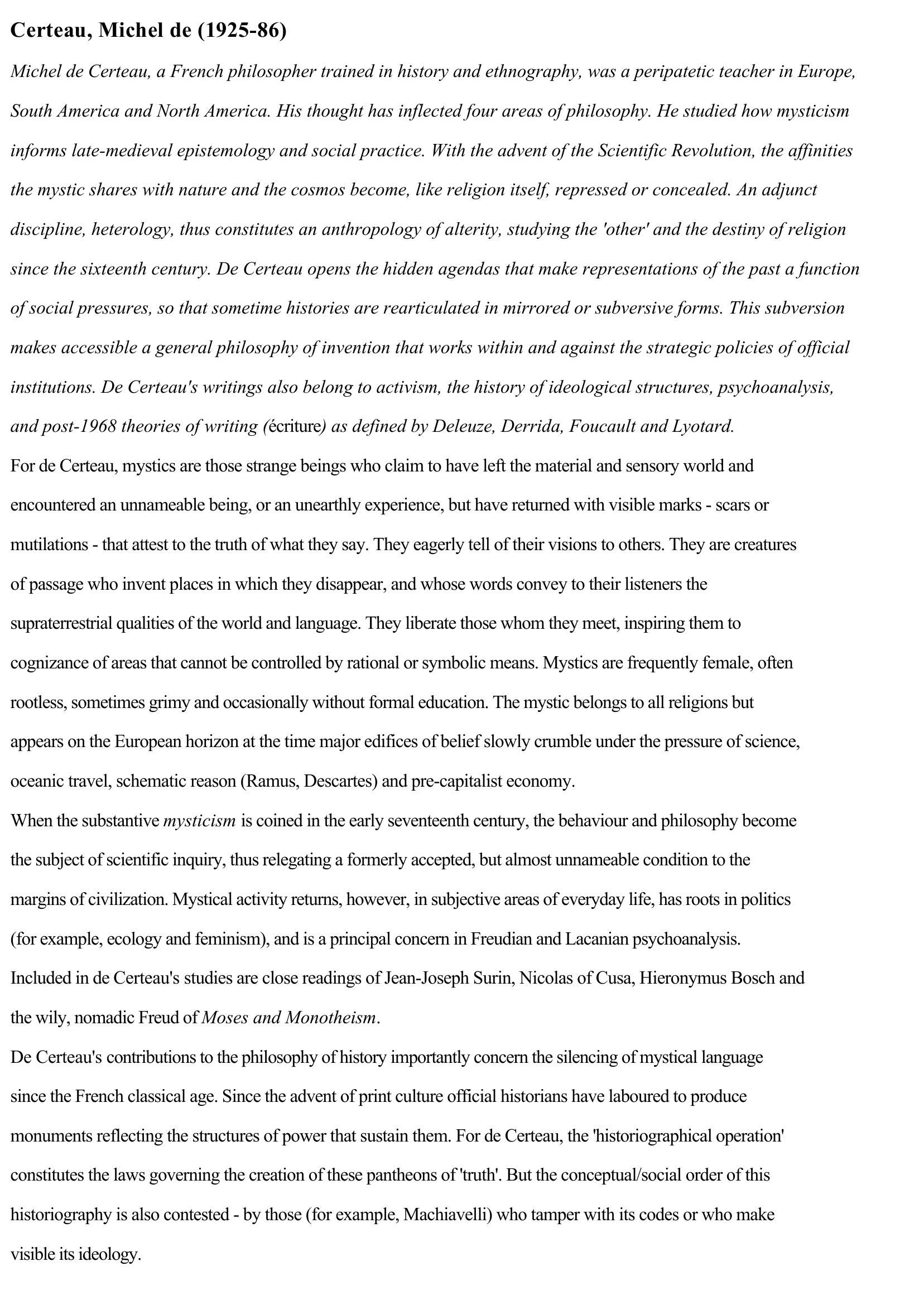Certeau, Michel de
Extrait du document
«
Certeau, Michel de (1925-86)
Michel de Certeau, a French philosopher trained in history and ethnography, was a peripatetic teacher in Europe,
South America and North America.
His thought has inflected four areas of philosophy.
He studied how mysticism
informs late-medieval epistemology and social practice.
With the advent of the Scientific Revolution, the affinities
the mystic shares with nature and the cosmos become, like religion itself, repressed or concealed.
An adjunct
discipline, heterology, thus constitutes an anthropology of alterity, studying the 'other' and the destiny of religion
since the sixteenth century.
De Certeau opens the hidden agendas that make representations of the past a function
of social pressures, so that sometime histories are rearticulated in mirrored or subversive forms.
This subversion
makes accessible a general philosophy of invention that works within and against the strategic policies of official
institutions.
De Certeau's writings also belong to activism, the history of ideological structures, psychoanalysis,
and post-1968 theories of writing (écriture) as defined by Deleuze, Derrida, Foucault and Lyotard.
For de Certeau, mystics are those strange beings who claim to have left the material and sensory world and
encountered an unnameable being, or an unearthly experience, but have returned with visible marks - scars or
mutilations - that attest to the truth of what they say.
They eagerly tell of their visions to others.
They are creatures
of passage who invent places in which they disappear, and whose words convey to their listeners the
supraterrestrial qualities of the world and language.
They liberate those whom they meet, inspiring them to
cognizance of areas that cannot be controlled by rational or symbolic means.
Mystics are frequently female, often
rootless, sometimes grimy and occasionally without formal education.
The mystic belongs to all religions but
appears on the European horizon at the time major edifices of belief slowly crumble under the pressure of science,
oceanic travel, schematic reason (Ramus, Descartes) and pre-capitalist economy.
When the substantive mysticism is coined in the early seventeenth century, the behaviour and philosophy become
the subject of scientific inquiry, thus relegating a formerly accepted, but almost unnameable condition to the
margins of civilization.
Mystical activity returns, however, in subjective areas of everyday life, has roots in politics
(for example, ecology and feminism), and is a principal concern in Freudian and Lacanian psychoanalysis.
Included in de Certeau's studies are close readings of Jean-Joseph Surin, Nicolas of Cusa, Hieronymus Bosch and
the wily, nomadic Freud of Moses and Monotheism.
De Certeau's contributions to the philosophy of history importantly concern the silencing of mystical language
since the French classical age.
Since the advent of print culture official historians have laboured to produce
monuments reflecting the structures of power that sustain them.
For de Certeau, the 'historiographical operation'
constitutes the laws governing the creation of these pantheons of 'truth'.
But the conceptual/social order of this
historiography is also contested - by those (for example, Machiavelli) who tamper with its codes or who make
visible its ideology..
»
↓↓↓ APERÇU DU DOCUMENT ↓↓↓
Liens utiles
- « C’est la folie qui détient la vérité de la psychologie » MICHEL FOUCAULT
- Le pouvoir produit du savoir; pouvoir et savoir s'impliquent directement l'un l'autre. Michel Foucault
- Le sexe, sphinx ou volonté de savoir ? Michel Foucault
- Michel Foucault
- L'anarchisme de Michel BAKOUNINE

































